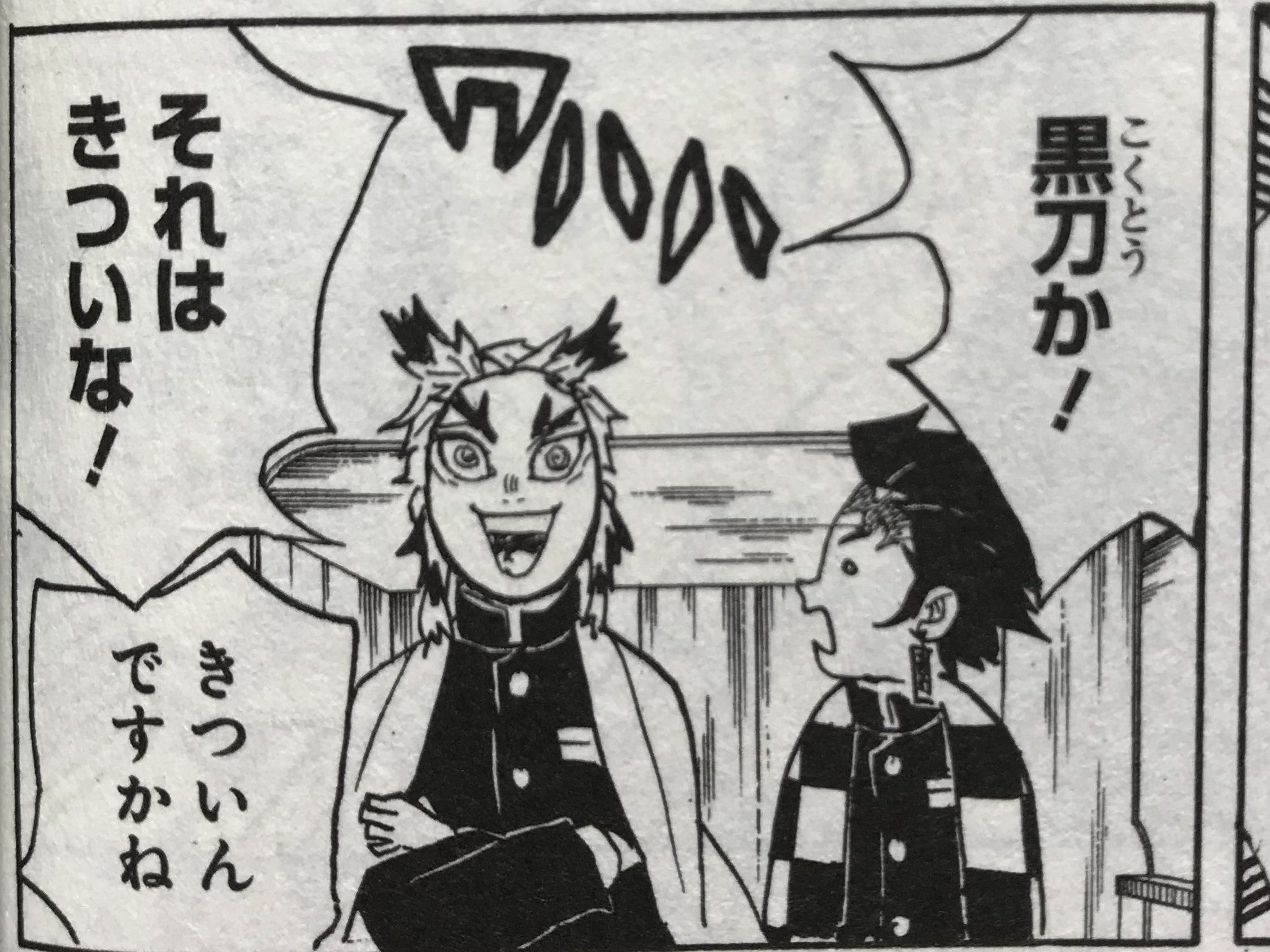Welcome to Kimetsu no Japanese, a site for learning Japanese from a manga Demon Slayer.
Today’s topic
Ch.54 Vol.7
Kyoujuro Rengoku (煉獄 杏寿郎)
Reference source : 五峠呼世晴 (2017) 鬼滅の刃7 集英社
それはきついな!
That’s rough.
Reference source : KOYOHARU GOTOUGE. (2019). DEMON SLAYER : KIMETSU NO YAIBA. VIZ Media, LL

It’s a phrase of Rengoku, he said it to Tanjiro when hearing that Tanjiro‘a sword is black.
Japanese original phrase is also simple and convenient. “Kitsui” has several meanings which you can use in various situation. Original Kimetsu phrases are ready!
Let’s use it casually and naturally!
Lesson
| JPN | それはきついな |
| JPN♪ | sore wa kitsui na |
| ENG | It is tough. |
| WORD | JPN♪ | MEANING |
|---|---|---|
| それ | sore | It |
| は | wa | <particle> Combined with “sore”, “sorewa” means “it is”. |
| きつい | kitsui | tough, difficult, hard, tight *Explanation 1 |
| な | na | <sentence-ending particle> Expressing “requiring consent / sympathy”, “receiving a fact with a slight amazement”, “desire” or “self-talk” *Explanation 2 |
Explanation 1 | kitsui
Rengoku said “kitsui” because he has no idea if Tanjiro could become Hashira or a good swordsman as there was almost no precedent of black Nichirinto. Tamjiro has a tough road ahead, the situation is not easy for him, that’s why he said “kitsui” to him.
Kitsui” has several meanings and can be used in a variety of cases but the core meaning is “hard”, “intense”. We don’t use this word for easygoing things.
Check the sample sentence / conversation to grasp the nuance of “kitsui” and learn how to use it.
NOT EASY / IMPOSSIBLE
| JPN | JPN♪ | MEANING |
|---|---|---|
| A: 俺は無惨を倒す! B: それはきついと思う。 | A: ore wa muzan o taosu! B: sore wa kitsui to omou. | A: I will kill Muzan! B: It may be impossible. |
AGONIZING
| JPN | JPN♪ | MEANING |
|---|---|---|
| A: 明日は柱の稽古なんだ。 B: それはきつい。 | A: asu wa hashira no keiko nanda. B: sore wa kitsui. | A: I have a Hashira training tomorrow. B: It sounds awful. |
VERY BAD / DISGUSTING (about a degree / quality of something)
| JPN | JPN♪ | MEANING |
|---|---|---|
| A: 善逸が変な化粧して女装している。 B: それはきついだろうな… | A: Zenitsu ga hen na keshō shite josō shiteiru. B: sore wa kitsui darōna. | A: Zenitsu is dressing himself as a woman making up weirdly. B: He may look ugly. |
STRONG
| JPN | JPN♪ | MEANING |
|---|---|---|
| A: 鬼はどうしたら倒せる? B: 奴らはきつい日差しで死ぬ。 | A: oni wa dōshitara taoseru? B: yatsura wa kitsui hizashi de shinu. | A: How to defeat demons? B: They will be killed by a strong sunlight. |
STRICT RULE
| JPN | JPN♪ | MEANING |
|---|---|---|
| 鱗滝は炭治郎をきつく戒めた | Urokodaki wa Tanjiro o kitsuku imashimeta. | Urokodaki admonished Tanjiro strictly. |
STRONG STIMULATION (mostly unpleasant)
| JPN | JPN♪ | MEANING |
|---|---|---|
| この臭いはきつい。 | kono nioi wa kitsui. | It smells terrible. |
HARSH (about personality)
| JPN | JPN♪ | MEANING |
|---|---|---|
| 不死川さんは性格がきつい。 | Mr. Shinazugawa wa seikaku ga kitsui. | Mr. Shinazugawa is harsh and difficult. |
TIGHT
| JPN | JPN♪ | MEANING |
|---|---|---|
| この隊服きついわ。 | kono taihuku kitsuiwa. | This corps’ clothing is tight for me. |
More
Other than the sentences showed above, there are more scenes we can use “kitsui”.
“kitsui” is used
- for extremely cold/hot weather
- for a strong alcohol
- for a strong words
Explanation 2 | “na” as sentence-ending particle
Japanese has lots of sentence ending-particles. Depending on a particle, the meaning of the sentence changes or we can recognize who talks the sentence.
“Na” is used basically when talking oneself.
今日は寒いな。(kyō wa samuina / Today is cold.)
When asking for consent to someone, be sure not to use “na” to superiors. It is rude!
Even not to superiors, be careful. “Na” sounds pushing your idea, so use milder word “ね (ne)” instead.
(“ne” means “requiring consent”, so it cannot be always swapped with “na” used with the other meaning.)
Here Rengoku used “な (na)” and it expresses his amazement.
Check more examples and learn how to use “na”.
Requiring consent / sympathy
| JPN | JPN♪ | MEANING |
|---|---|---|
| いいな、無残を倒すまで死ぬなよ! | iina, muzan o taosu made shinunayo | OK? Do not die until we kill Muzan! |
Tweet from your heart
| JPN | JPN♪ | MEANING |
|---|---|---|
| そうだな、水の呼吸は君に合わないのかもしれない。 | sōdana, mizu no kokyū wa kimi ni awanai nokamo shirenai | Yeah, that’s right, Water Breathing may not go well with you. |
Admiration
| JPN | JPN♪ | MEANING |
|---|---|---|
| 禰豆子ちゃんに会いたいな | nezuko chan ni aitai na | I want to see Nezuko-chan. |
That’s all
I hope you have got the nuance of “kitsui” and sentence-ending particle “na”.
As I said, “kitsui” is used casually and you will find lots of Japanese people use this word in conversations or even on the net.
“Na” is mostly for self-talking or desire. When you use “na” unconsciously, it means you are now a good Japanese user!


Comment